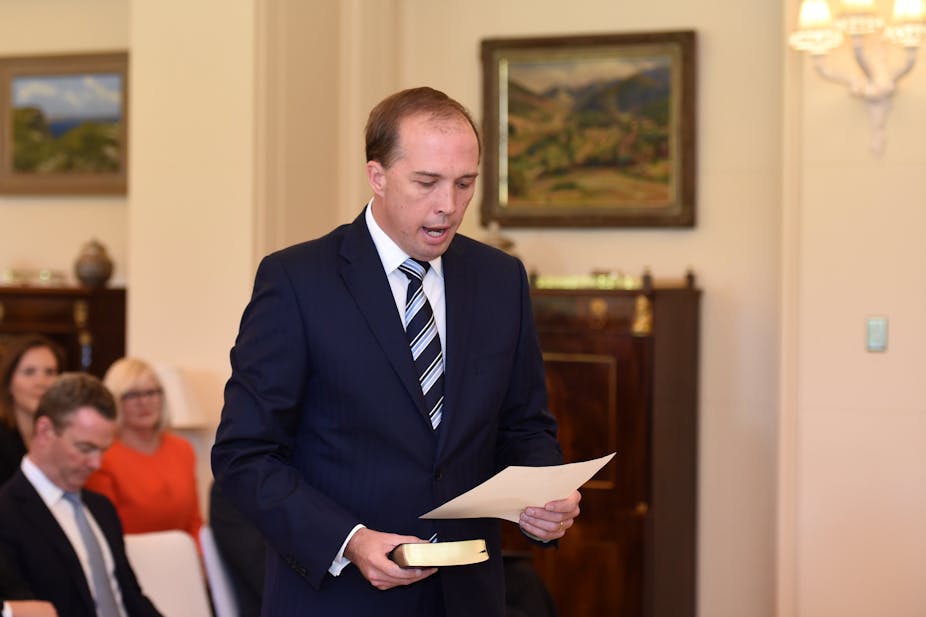2014 was the year of triumphant press conferences at which the Abbott government affirmed its determination to “stop the boats” and outlined its success at doing so. However, 2015 is likely to be much more difficult for the government to negotiate in the area of asylum seeker policy.
In his public comments since being appointed as minister for immigration and border protection, Peter Dutton has continued in the “bad cop”, border protector image of his predecessor, Scott Morrison. He promised to target non-citizen permanent residents who have a criminal record and are vulnerable to deportation.
Dutton also backed the use of force by detention authorities to end protests on Manus Island while stressing repeatedly that no asylum seeker arriving by boat would be resettled in Australia.
An end to offshore detention?
Stopping the boats was always the easy part of the government’s policy. It came with tangible results, and hidden and delayed costs. In 2015, those costs are quickly materialising.
In most cases, stopping the boats meant redirecting boat arrivals to Nauru and Manus Island. The Gillard government restarted offshore processing on Nauru and Manus Island in August and November 2012. The detention centres were quickly filled.
The majority of detainees are genuine refugees and require resettlement. The problem for the government is that, having ruled out resettlement in Australia, there are now very few sustainable options for resettling these refugees. 2015 will see continued efforts to pressure nations in Australia’s region to take in refugees from Nauru and Manus Island. The Cambodia deal seems close to completion and, if it holds up, refugees may be transferred there.

However, this is unlikely to be an easy story for the government to sell. Although Cambodia became a signatory to the UN Refugee Convention in 1992, it was a source country for asylum seekers to Australia in the 1990s. More recently, it was engulfed in a human rights crisis after elections in 2013, and its treatment of Montagnard refugees from Vietnam has come under criticism.
In November 2014, ten refugees on Manus Island were granted temporary visas to live and work in Papua New Guinea. How well these refugees adapt to life in PNG will determine whether this will be a more extensive part of the resettlement program. Given the state of the PNG economy, and the stark cultural differences between refugees on Manus Island and PNG locals, this does not seem likely.
As the time people spend in appalling conditions in detention centres continues to grow, Dutton has conceded that “flash points” like those recently experienced on Manus Island are likely to continue to occur.
The government will find it increasingly difficult to defend its offshore detention regime now that the boats have stopped. Demands to stop the suffering of the unlucky asylum seekers on Nauru and Manus Island will grow louder and international pressure will mount.
Legislative changes punish refugees
Amendments to the Migration Act, passed on the last parliamentary sitting day of 2014, have profoundly altered the claims process for asylum seekers who arrived in Australia by boat since 2012.
The amendments removed the Refugee Convention provisions from the Migration Act and incorporated new and more onerous requirements for satisfying the definition of a refugee. If the Department of Immigration rejects a claim under the new regime, asylum seekers who arrived by boat between August 13, 2012, and December 1, 2014, no longer seek review in the Refugee Review Tribunal, but in a new review body, the Immigration Assessment Authority.
Other than in exceptional circumstances, the authority does not hold hearings and is required to review decisions on the papers provided to it from original decisions. Decisions of the authority are likely to be the subject of challenges in the courts on a range of grounds, including the correct interpretation of Australia’s protection obligations, the authority’s jurisdiction and the procedural fairness of the processing regime.

Some of these claims may succeed, but most will fail. When the dust settles, many thousands of asylum seekers who have been living in the community or in immigration detention in Australia will likely be deported to their country of origin. If this occurs, we are likely to hear more stories of returned refugees being killed by those they attempted to flee, or escaping again in search of protection.
If claimants are successful under the new processing regime, they are eligible for temporary – not permanent – protection visas. The Palmer United Party negotiated for a new temporary protection visa, the five-year Safe Haven Enterprise visa, which provides a pathway to a further substantive visa for those who work in designated regional areas for three-and-a-half years during the life of the visa.
However, how this visa will work remains unclear. Where will refugees be able to work? What support will they get to settle in regional areas? Will they require sponsors to work, or will they be free to enter the regional job market unrestricted, alongside working holidaymakers and international students?
Watch in 2015 for stories of the success or otherwise of refugees as workers in regional Australia, and for complaints of their exploitation.
The government shows every indication of maintaining its tough line on asylum seekers in 2015. But now that the boat crisis is over, this may sound less convincing in the face of the continuing trauma of asylum seekers in Australia’s midst.
Catch up on the rest of The Conversation’s Shaping 2015 series here.
Editor’s note: This article originally stated that the Refugee Review Tribunal had been abolished. This is incorrect and the article has been amended.

